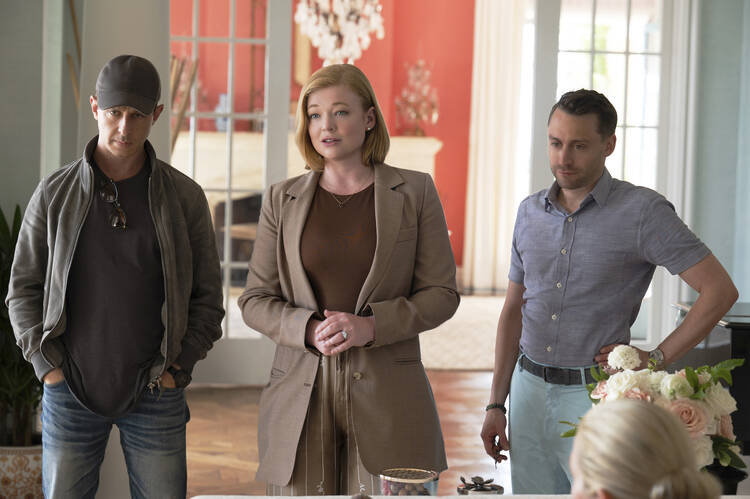That ‘Succession’ twist has us asking: Is the Roy family beyond salvation?
Please note: This article contains spoilers for the third episode of season four of “Succession.”
If you haven’t watched last night’s “Succession,” turn back now.
I'll wait.
Last night, Logan Roy died.
Not only that, he died offscreen. For almost half an hour we watched people nearby describe what was going on, as the medical efforts being used were relayed to his children listening on speaker from a cell phone, we never actually saw Logan. It was so offscreen that it was hard to believe that it was actually happening. And given what we know of Logan Roy, it was certainly conceivable that this was in fact just some new mind game he was playing to gain the upper hand on his children.
But no, it was all real. Logan Roy died. And for most of an hour we sat with his kids as they struggled to comprehend this. Just like we all do when death comes suddenly, as it so often does.
Episode 403, “Connor’s Wedding,” will immediately go down as one of the greatest onscreen representations of the experience of the loss of a loved one, right alongside “Buffy The Vampire Slayer’s” season 5 episode “The Body,” in which Buffy finds her mother suddenly dead, and the pilot of “Twin Peaks.”
The Roy family is basically human cancer: Everywhere they go, they metastasize new horrors upon the world and one another.
Those three episodes share a sense of the profound dislocation that comes with the experience of suddenly losing a parent, the way it renders the world suddenly frightening and unfamiliar. But for me, what was particularly striking about “Succession’s” confrontation with mortality was the way in which the kids handled what was going on. At this point, we have spent over three years watching these kids and their father undermine each other and pretty much everyone else who comes within range of them. The Roy family is basically human cancer: Everywhere they go, they metastasize new horrors upon the world and one another.
And yet, in that moment, the kids were there for each other and their father about as well as you could ever expect anyone to be in that situation. It might be the greatest trick that showrunner Jesse Armstrong has ever played, to spend three years telling us these are the worst human beings ever, people from whose misery we derive joy, and then reveal that actually underneath it all they are capable of loving each other as well as anyone could.
I find it prompts the question of the assumptions we make about the people in our lives, maybe particularly those in our families with whom we find no common ground or who seem to be, in general, the worst. Is that really all there is to them? Most of an iceberg sits below the surface of the water; from time to time might the same be true of us?
I realize that I am very much at the risk here of turning one of the meanest shows on television into an after-school special. “Succession” is absolutely not “One to Grow On.” Next week Roman, Kendall, Shiv and Connor will no doubt be ruining each other’s lives once again.
If “Succession” ends as a sort of Shakespearean tragedy, as all signs thus far have suggested that it will, this week’s episode may well be the moment we look back on as that tragedy’s core.
But this week they showed a capacity to be there for each other that to my mind revealed the deeper truth of their characters, who they really are and what they really feel for each other. And the experience of death in a family can be like that. It is a moment in which all the accumulated debris of our lives is momentarily cleared away, quite literally a moment of revelation. People like to argue about why or whether Jesus had to die, but on one level it is as simple as this: Death has a tendency to show us the truth, both of the person who died and ourselves. With no more shared experiences to come, whether positive or negative, there is the possibility of a new clarity. That can be shattering, but it can also be a liberation. It brings us back to the essential things.
If “Succession” ends as a sort of Shakespearean tragedy, as all signs thus far have suggested that it will, this week’s episode may well be the moment we look back on as that tragedy’s core, the deeper care for one another that they then betrayed or ignored. But what’s to say that care can’t find its way back to the surface yet again? Isn’t that exactly how things work for us? Maybe in the end nothing is ever fully lost, and no relationship ever completely beyond salvation.


No comments:
Post a Comment